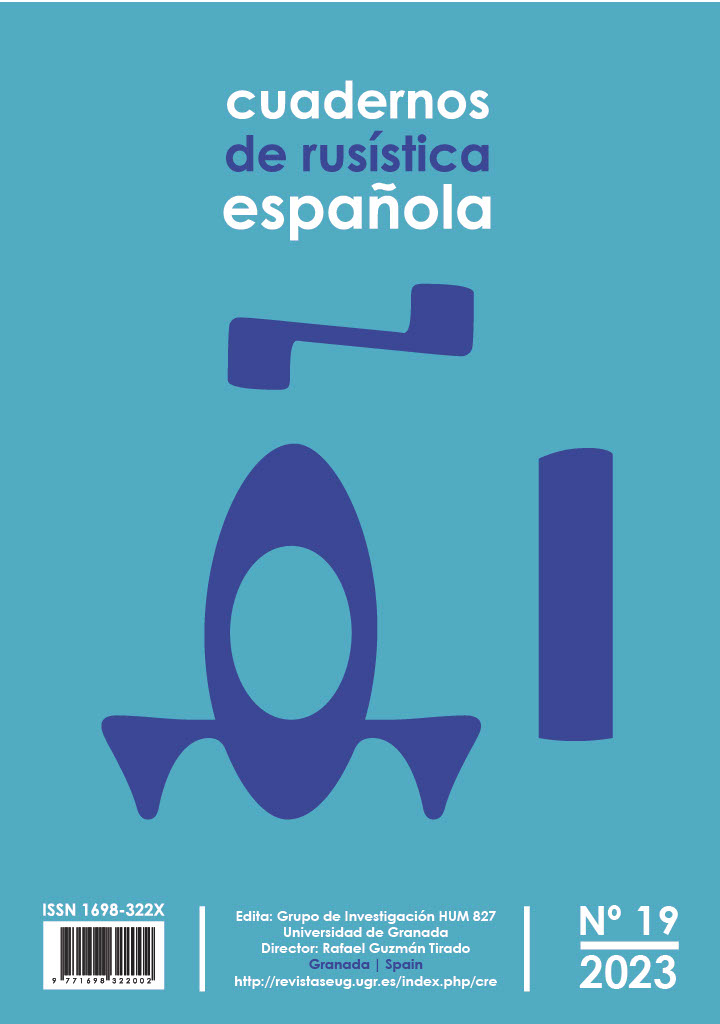On the Semantics of the Title of M. Stepnova’s Novel "The Garden"
DOI:
https://doi.org/10.30827/cre.v19.28591Palabras clave:
semantics, concept, symbol, garden, Marina StepanovaResumen
The article is devoted to a specific concept based on the material of one of the literary texts of the latest Russian literature. In the novel by M. Stepnova (2019), the concept of “garden” is central and fundamentally important. In the author’s picture of the world of a 21st-century writer, this concept becomes the title of the literary work, conceptually significant in the national picture of the world. In this regard, it was appropriate and logical to analyze the concept, taking into account all the potential inherent in the meaning of the word “garden”, in the broadest sense, especially since “garden” is manifested in many ways in the novel. The concept of “garden” reflects the World of Russian estate life in the 19th and early 20th centuries, captured primarily by L. N. Tolstoy, A. P. Chekhov, and I. A. Bunin. In the literary text of M. Stepnova, the concept of “garden” is presented as a hero, a book, a text, Eden, and is both an image and a symbol. In addition, the concept of “garden” in the context of the novel acquires additional connotations and meanings, giving rise to new associations invisible at first glance. Thus, the semantics of the name appear multilevel because it includes both Western European traditional and nationally determined ideas, which is proved in this study.
Descargas
Citas
ALEFIRENKO, N. F. (2009): Zhivoe slovo: Problemy funkcioninal'noj leksikologii: monografiya. M. Flinta: Nauka.
DOLNÍK, J. (2010): Jazyk – človek – kultúra. Bratislava: Kalligram.
DOLNÍK, J. (2012): Sila jazyka. Bratislava: Kalligram.
EVANS, V. (2007): A Glossary of Cognitive Linguistics. Edinburgh: Edinburgh University Press. DOI: https://doi.org/10.1515/9780748629862
FAUCONNIER, G., TURNER, M. (1998): Blending As A Central Process of Grammar // MARK TURNER. [Electronic resource]: http://markturner.org/centralprocess.WWW/centralprocess.html (Accessed 21 June 2023).
FRANCIS, M., HESTER Jr., R. T. (Eds.) (2020): The Meaning of Gardens. MIT Press, // [Electronic resource] https://mitpress.mit.edu/books/meaning-gardens (Accessed 20 June 2023).
HANSEN-LÖVE, A. A. (1989): Der russische Symbolismus. VERLAG DER OSTERREICHISCHEN AKADEMIE DER WISSENSCHAFTEN WIEN.
HANSEN-LÖVE, A. A. (2003): Russkij simvolizm. Sistema poeticheskih motivov. Mifoeticheskij simvolizm. Kosmicheskaja simvolika. SPb: Akademicheskij proekt.
HASPELMATH, M., TADMOR, U. (Eds.) (2009): Loanwords in the world’s languages: A comparative handbook. Berlin: De Gruyter Mouton. DOI: https://doi.org/10.1515/9783110218442
KOLESOV, V. V. (1999): Theses on the Russian mentality // "Life comes from the word ...", SPb.
LANGACKER, R.W. (1991): Concept, Image and Symbol. Berlin, N.Y., 1991. // [Electronic resource] https://fdocuments.in/document/langacker-concept-image-and-symbol.htm (Accessed 10 July 2022).
LIKHACHEV, D. S. (1998): Poetry of Gardens: Towards the Semantics of Gardening Styles. Garden as text. M.: Consent. P. 471 [Electronic resource] // URL: https://www.lihachev.ru/lihachev/bibliografiya/5064/ (Accessed 11 September 2022).
NORMAN, B. Ju. (2013: Kognitivnyj sintaksis russkogo yazyka. M: Flinta – Nauka.
OZHEGOV, S.I. (1986): Dictionary of the Russian language. M: Russian language.
STEPNOVA, M. (2021): Garden / Open Book@ TV Channel Culture / 19 February 2021 [Electronic resource] // youtube.com / watch? V = 6k - -r_H-p1 (Accessed 20 February 2023).
PISAREVA, E. (2021): Marina Stepnova: "Chopping off culture in the media is leave the body without a spleen". 7 April 2021 [Electronic resource] //https://daily.afisha.ru/brain/19347-marina-stepnova-otrubit-v-smi-kulturu-eto-ostavit-organizm-bez-selezenki/ (Accessed 9 April 2021).
STEPANOV, Yu.S. (2021): Constants: Dictionary of Russian Culture / Ed. 2nd, rev. and add. M: Academic project.
STEPNOVA, M. L. (2020): Garden: a novel. M .: Publishing house AST: Edited by Elena Shubina.
SCHWARZ, M., CHUR, J. (1996): Semantik. Ein Arbeitsbuch. Tübingen: Narr.
TABAKOWSKA, E. (2000): Językoznawstwo kognitywne – nowe czy dawne horyzonty badań nad językiem? // G. Szpila (red.). Język i komunikacja 1. Język trzeciego tysiąclecia. Kraków: Tertium, pp. 56–58.
TRESIDDER, J. (2001): Slovar' simvolov. M. Izd.-torg. dom "Grand": Fair–press, 2001. // [Electronic resource] //https://www.rulit.me/books/slovar-simvolov-read-113027-78.html (Accessed 12 June 2023).
TRESIDDER, J. (1998): The Complete Dictionary of Symbols // Great Dictionary of Russian language. SPb: Norint. / S.A. Kuznetsov.
TRESIDDER, J. (1998): The Complete Dictionary of Symbols. // [Electronic resource] https://www.gumer.info/bibliotek_Buks/Culture/JekTresidder/index.php (Accessed 12 June 2021).
WIERBICKA, A. (1992): Semantics, Culture and Cognition: Universal human concepts in culture-specific configurations. Oxford, New York: Oxford University Press. [Electronic resource] // URL: https://www.cambridge.org/core/journals/language-in-society/article/abs/anna- wierzbicka-semantics-culture-and-cognition-universal-human-concepts-in-culturespecific-config (Accessed 10 June 2022).
WOLF, H.-G., POLZENHAGEN, F. (2009): World Englishes. A Cognitive Sociolinguistic Approach (Applications of Cognitive Linguistics). Hague: Mouton de Gruyter. DOI: https://doi.org/10.1515/9783110199222












